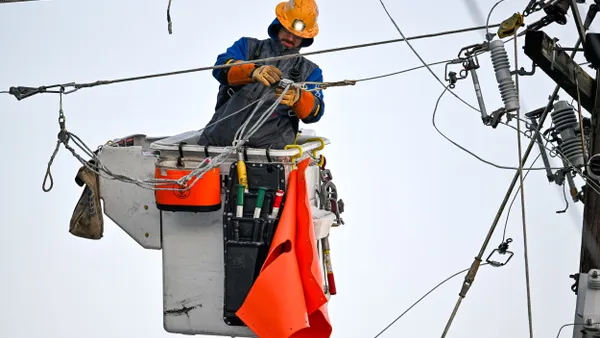Dive Brief:
- Power sector experts and renewable energy developers are closely watching the new GOP tax reform package and the Energy Department's cost recovery proposal for baseload generation, noting the uncertainty that's been injected in national markets at an annual conference hosted by the Clean Energy States Alliance Tuesday.
- DOE Deputy Assistant Secretary for Transmission Permitting & Technical Assistance Katie Jereza praised Secretary Rick Perry's "bold steps" in issuing the proposal, while outlining the agency's agenda to boost resilience. The agency is holding to an all-of-the-above energy strategy, which includes renewable energy, she noted.
- Even so, stakeholders raised questions about the 90-day onsite fuel requirement in the NOPR and expressed skepticism over DOE's role in choosing one type of fuel resource over the other.
Dive Insight:
There were few answers but several questions over recent newsmaking events in the renewable energy sector during the RPS Summit in Virginia. Participants explored impacts on the sector ranging from a controversial solar trade case to the DOE's equally contentious NOPR. Panelists noted the uncertainty injected by these issues — and to a large extent, the Trump administration's energy policy as a whole — has many renewable energy developers on edge.
For instance, the newly unveiled tax package would trim the wind energy production tax credit to 1.5¢/kWh from 2.3¢/kWh and harden its expiration date. The bill also takes aim at federal tax credits for electric vehicles, but would extend credits for a variety of residential and commercial energy technologies to 2022.
For the most part, DOE's Jereza, former director for infrastructure resilience from utility trade group Edison Electric Institute, stuck to Perry's talking points.
"Our country has experienced in recent times natural disasters that provide so grave a reminder the need for a secure, reliable and resilient infrastructure," Jereza said, referring to the three hurricanes that recently battered Texas, Florida and Puerto Rico. "Secretary Perry has focused on the reliability of our electric grid since day one. Secretary Perry took the bold step of proposing a rulemaking to [the Federal Energy Regulatory Commission] FERC to ensure the reliability and resiliency of the electric grid."
DOE's proposal to provide cost recovery for struggling coal and nuclear plants in a handful of wholesale power markets has drawn fire from a diverse set of stakeholders. Natural gas and renewable energy groups aligned to condemn the proposal; The vast majority of utilities and a cohort of former FERC commissioners expressed displeasure at the NOPR as well.
When questioned about renewable energy's role in boosting resilience, Jereza hedged. "Renewables do have a role in resilience," she said, but deferred to the administration's preference for an "all-of-the-above" energy strategy.
Most notably, stakeholders took issue with the DOE's push to value resources with a 90-day supply of fuel onsite — designed to favor coal-fired and nuclear power plants.
David Littell, a former utility regulator from Maine and now an analyst with the Regulatory Assistance Project, asserted wind and solar do have fuel onsite, but it's up to FERC to determine how to value each resource.
"[FERC] needs to give very clear guidance over what attributes are valued and not put a thumb on the scale on either side," he said.












